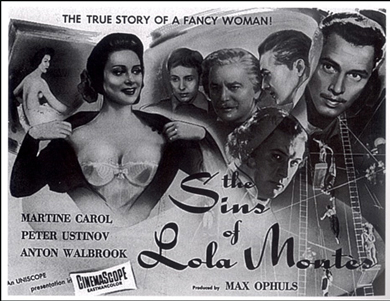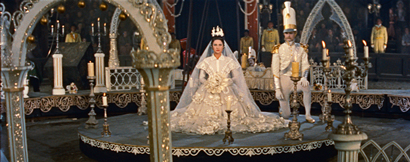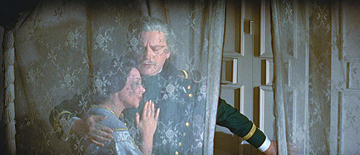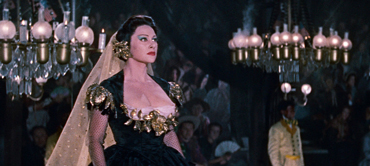
 |
|
|
|
Some movies are irresistible bait for the avid cinephile, even if they received a mixed or negative public response when new. Acknowledged classics in this vein are Metropolis, The Magnificent Ambersons, The Wild Bunch and Eyes Without a Face. The final work of Max Ophüls, a revered filmmaker known for masterpieces both in France (La Ronde) and America (Letter from an Unknown Woman), 1955's Lola Montès was initially regarded as an expensive, dismal flop, an injustice compounded by ruinous re-cuts made by its producers to recoup their losses. Originally filmed in French, German and English language versions, the movie suffered a jumble of editorial butcherings, including a shoddy American version (The Sins of Lola Montès) that chopped several reels from its running time. As the film was long thought to be all but lost, classic film fans are particularly encouraged by this promising new restoration. 
The French premiere audience apparently came with expectations of a racy cinematic account of the courtesan Lola Montez (Spanish spelling), the most notorious female adventuress of the 19th century. They didn't respond to director Ophüls' stylized narrative -- now acknowledged as a cinematic revelation -- and in particular criticized the inexpressive actress chosen to play Lola Montès. The producers forced Martine Carol on the director because she was a top box office draw, best known for daringly low necklines and occasional topless scenes in gaudy period pictures. We're told that French filmgoers booed when Ophüls refrained from employing such excesses. The director of the insightful Earrings of Madam de... elides obvious sex scenes to pursue a larger statement about the role of beautiful female celebrities in society. Instead of a straight biographical accounting of Lola's many romantic liaisons, Ophüls opts to tell her life story through her own memories, experienced in the form of a fantastic "memory circus". Peter Ustinov appears as the American ringmaster of the Mammoth Circus, touting Lola as a curiosity of the first rank. In graceful, hypnotically complicated tracking shots, Lola (Martine Carol) appears in the center of a whirlwind of moving scenery and costumed performers, including a platoon of Lola look-alikes. Lola's marriage (to her mother's lover) is depicted by placing her at the center of revolving scenery that resembles a wedding cake. At the sunset of her life, Lola has become a major attraction; the ringmaster even compares her to an elephant that has been taught to play the piano. The elephant didn't cooperate at first, but now he loves music... Once a master manipulator of scandalous publicity, Lola has been compelled by poor health to display her own life as a gaudy public spectacle. Clowns, musicians, equestrians and a strong man (Ady Berber) aid in the retelling, from her youth as the unloved daughter of an amorous widow to her career as a social climber among crowned heads. The ringmaster enumerates Lola's many lovers for the pleasure of the crowd and sells the opportunity to ask her "indiscreet" questions at 25 cents a throw. The ringmaster repeatedly asks Lola how she feels -- she endures what should be a humiliating ordeal mostly by sitting motionless and staring forward. Her first and last dialogue line is, "I'll be all right." Although Lola never actually appeared in a circus, Lola Montès doesn't exaggerate its heroine's life and times. Max Ophüls' circus phantasmagoria is best interpreted as a cinematic representation of Lola's own distorted opinion of her past, as a second-rate Spanish dancer who made her name and fame by attracting famous men. The film shifts frequently from the circus setting to Lola's own flashback memories, as she meets a succession of lovers in her travels across Europe. The first flashback shows Lola breaking up with the composer Franz Liszt (Will Quadflieg) while en route through Italy in his large wagon-caravan. Lola's own coach with her own servants is never far behind, ready in case Lola feels the need to break off an affair. Shorter flashbacks show Lola as a sixteen year-old returning from India and rebelling against her mother's plan to marry her off to an aged Count. We're told that audiences laughed at the sight of the 35 year-old Ms. Carol playing this child, although the film's dream-like structure and art direction should encourage us to view the flashback as Lola's subjective memory. 
Back in the circus setting, the sickly Lola performs the only strenuous part of her act. She walks a tightrope before a series of painted backdrops representing the different countries where her affairs have taken place. The ringmaster checks off her long string of lovers and sings a song that enumerates the charms of her various body parts. Thus Lola's passions are reduced to an accounting, with details concerning the money she earns and the extra coins collected for the indiscreet questions, etc. The parade of European capitols reminds us of the themed restaurant in Letter from an Unknown Woman, where diners pretend they're on a lovers' holiday as a canvas backdrop of various romantic cities rolls past their dinner table. As Lola waits atop an aerialist's perch high above the circus ring, the final and longest flashback picks up Lola as her coach enters snowy Bavaria. She accosts (and apparently beds) a handsome young student to guide her to the capitol (Oskar Werner of Fahrenheit 451). Lola then meets (and apparently beds) an officer in the royal guard. When he's too slow to make good on his promise to introduce her to Ludwig, the King (Anton Walbrook), Lola bolts her horse through a formal parade to get the King's attention. Ludwig soon attends one of Lola's dance exhibitions. She was known as a mediocre dancer at best, but the King is clearly captivated. She soon becomes a permanent fixture in the palace; Ludwig gives her a title and an estate. A revolution spurred by public sentiment against Lola forces her to abandon her King and flee. She's rescued by the student again -- his fraternity is loyal to the King and the King's mistress -- but turns down the boy's offer of an obscure and happy family life away from the madness of her many affairs. The film ends with Lola in the circus, reduced to a static beauty desired by all but incapable of love. She sells herself symbolically to hundreds of men at the same time. Displayed like one of the big top's wild animals in a disturbingly vulgar cage exhibit, Lola is a fascinating symbol of passion upon which male fantasies can be projected. Does the individual woman inside still exist, and does it matter if she does? Lola stares straight ahead in her strange existential prison and smiles at the endless line of admirers: "I'll be all right". Lola Montès has a lavish look in the splendor of CinemaScope and color. Besides the breathtaking circus with its dozens of weirdly costumed characters -- color-coded dwarfs and sinister bellboys covered head to toe in red -- relatively brief scenes use hundreds of carefully costumed extras, as in the parade that Lola interrupts on horseback. Ophüls designs many scenes for his crane, following Lola and her mother up several flights of stairs and tracking with the King's retinue as forty people scramble through the palace looking for a needle and thread. The calculating Lola has torn the bodice of her dress to prove to Ludwig that her figure is indeed the best in Europe. This is probably where Martine Carol's fans felt most cheated. 
Ophüls staging is more precise than ever. The 'Scope lens prowls through claustrophobic chambers and regards the actors through intervening curtains, iron railings and masonry that splinters the widescreen frame into smaller sections. For selected shots the director employs soft masks, blocking out part of the frame to isolate Lola from her context, much as D.W. Griffith employed an iris before the widespread use of the close-up. Every scene shows a fresh eye for visual textures and camera blocking that comments on Lola's relationships with the various men in her life. She may be at her most honest when the ringmaster remarks that she may be the most beautiful woman he's ever seen. Lola's dismissive response: "Don't be foolish, like the others." The actors are all quite good, especially Anton Walbrook and Oskar Werner; Peter Ustinov's ringmaster of ceremonies holds half of the movie together literally on his own. Martine Carol is indeed not enough of an actress to fully animate Lola. Her attempts to cry on camera are pitiful, and with the exception of her devotion to King Ludwig, we never can tell how she feels about any of her male conquests. Critics of 1955 must have been waiting in ambush to report that Ms. Carol still attracts attention mainly for the spectacle of her bosom. Director Ophüls compensates fully, molding the character by externalizing her inner confusion in the gigantic circus, and organizing his expressive camera to act for her. And that's no mean achievement. Lola Montès is undiluted cinema, communicating feelings and themes that theatrical acting cannot. Criterion's Blu-ray of Lola Montès is a revelation, as modern digital restoration work has been able to correct most of the problems encountered in the return of Ophüls' masterpiece to its original French release version. The original negative was cut for later versions, some of which attempted to force Lola's flashbacks back into linear continuity. Sections of the film had to be recovered from archived original color separations and by mixing and matching second- and third-generation footage found in the other language versions. The ability of digital tools to alter contrast and boost colors returns faded scenes to their original luster, with only a few scenes and cutaways revealing heightened grain. The circus scenes are much improved over 35mm prints from the early 1970s, that washed out all those bright hues. At 114 minutes and restored to an original stereophonic French track, Lola also sounds better than ever. Georges Auric's hauntingly beautiful romantic theme weaves in and out of the story as an external representation of the amorous ironies in the life of Europe's most notorious courtesan. 
The commentary by author Susan White addresses the movie from all angles while commenting on individual images and directorial choices. A long-form 1965 documentary from French television has wonderful vintage interview material with many of the director's noted actors and collaborators. The director's son Marcel Ophüls contributes a new documentary on his father that focuses special attention on Lola Montès. As an added extra, a brief hairstyle test of Martine Carol shows the actress relaxed and unguarded, showing expressions of amusement not seen in the movie itself. An excellent reissue trailer finishes the video extras. A 24-page insert booklet contains an essay by Gary Giddens and a full explanation of the restoration process. Criterion's disc producer is Johanna Schiller. Lola Montès is being released simultaneously on DVD.
Reference: A vintage account of the life of the actual Lola Montès from an 1880 edition of
On a scale of Excellent, Good, Fair, and Poor,
Lola Montès Blu-ray rates:
Reviews on the Savant main site have additional credits information and are often updated and annotated with reader input and graphics. Also, don't forget the 2010 Savant Wish List. T'was Ever Thus.
Review Staff | About DVD Talk | Newsletter Subscribe | Join DVD Talk Forum |
| ||||||||||||||||||